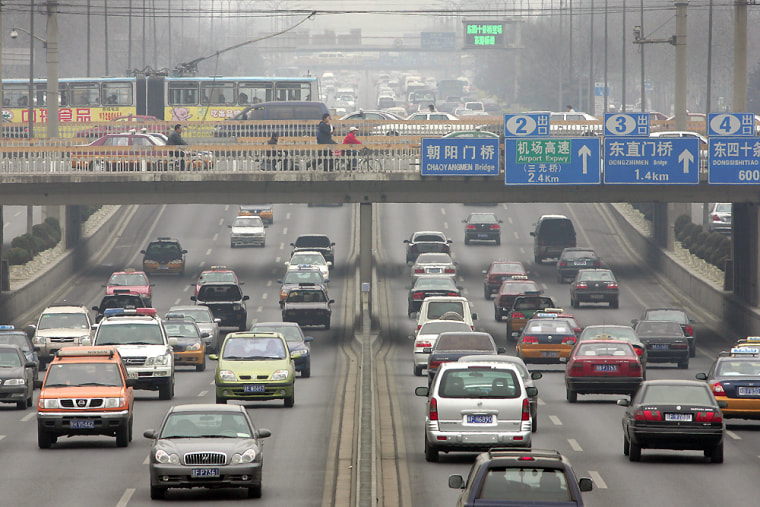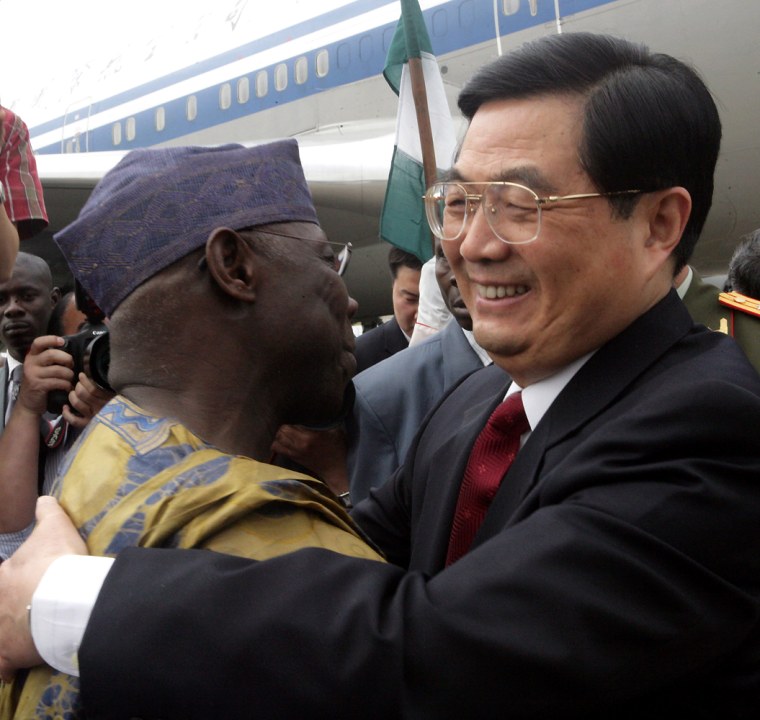Americans feeling the pain at the pump also are feeling the impact of China's prosperity. With gas prices hovering above $3 a gallon in many places, analysts say the spike is due, in large part, to the rising demand in the 1.2 billion-strong nation — where economic growth was a whopping 9.9 percent last year.
Is there an end in sight? Not if Beijing has anything to say about it. For the Chinese leadership, survival depends on maintaining momentum, which is why Chinese companies have struck out in all directions to secure oil deals.
It is a quest that now largely drives Chinese foreign policy, displacing old ideological concerns, and has led to a pragmatic view of the world in which no oil-rich country is too dangerous or remote for exploration, and no regime too corrupt or unsavory for a contract.
That's why, after his trip to the United States in April, Chinese President Hu Jintao jetted off to Saudi Arabia to shore up ties with the world's largest oil producer. After a brief stop in Morocco, he traveled to Nigeria, where he agreed to a $4 billion investment in infrastructure in return for first dibs on a specific drilling area in the impoverished but oil-rich African nation. He went on to sign a deal for oil exploration rights in Kenya, a country that has only begun to assess its potential oil reserves.
"From the Chinese oil companies' point of view, there’s a sense that (they're) late comers in the oil field," said Erica Downs, an expert on China's energy policy at the Brookings Institution. With many of the world's tapped resources under the influence of major Western oil companies, "they feel that there’s not that much left. So whatever (they) can do to get deals (they'll) do."
As the economic reforms have built steam, China has dumped its communist evangelism in developing countries. Instead, it is now investing in far-flung countries large and small that have oil reserves, vying for a share of new production, courting major Middle Eastern oil producers, and building pipelines to transport the oil to its own energy-hungry industries and car owners.
In doing so, China is bumping up against the interests of established international oil companies, humanitarian initiatives, and striking deals with countries Washington considers rogues, undermining efforts to marginalize them.
The future: More, more, more
China was long an oil exporter. But starting in 1993, explosive industrial growth and dwindling production in its own oil fields reversed the flow. It is now the second largest oil consumer behind the United States, having surpassed Japan.

There's no reason to expect China's demand to ease. The number of privately owned automobiles in China is now 23 million, more than double the figure three years ago, and is expected to jump to 130 million by 2030. Overall, the typical Chinese citizen still only consumes a fraction of the energy an American consumes.
Even if Beijing develops alternative energy sources and achieves greater efficiency — and it has ambitious plans to do so — it is still destined to be an elephant among world oil consumers.
The reality has prompted Beijing to discard old notions of self-sufficiency and adopt a "going out" policy to secure resources outside China.
Treading on controversial turf
One of its most ambitious investment proposals targets Iran, which has the third largest proven oil reserves in the world. In 2005, China bought about 11 percent of its crude oil imports from Iran. But what China really seeks is to tap into Iran's vast reserves directly, through investments in exploration and production.
For two years, China has been pushing a $100 billion deal that would grant the state oil company Sinopec a 50 percent development stake in Iran's Yadavaran field. It has simultaneously made goodwill investments in other projects, such as Tehran's subway system. However, negotiation has been tortured because of differences over pricing, and Sinopec said in March that talks had broken down, so it's not clear that the deal will bear fruit.
Nonetheless, Beijing's pursuits show that it is eager to take advantage of openings in countries where its would-be competitors are barred from doing business, as U.S. companies are in Iran under sanctions imposed by Washington. It also has demonstrated that it will use its permanent position in the U.N. Security Council to oppose multilateral sanctions that would prevent its own companies from doing the same.
Although Beijing has joined the chorus calling for Iran to fully account for its nuclear program, amid suspicions that Tehran is developing nuclear weapons, China has also indicated that it would veto sanctions to force Iran's full disclosure.
Political pariah
In oil-rich Sudan, China is by far the largest investor — indeed, it is almost alone in the field owing to bilateral sanctions observed by other countries. Since 1997, China has invested billions of dollars in Sudan, despite the emerging evidence that Khartoum government supports janjaweed militias that have massacred tens of thousands of people in the Darfur region in recent years. Critics point out that even the weapons used by the military and the militia are Chinese models made under license in local factories.
"When it comes to human rights, China's foreign policy is deliberately agnostic," Human Rights Watch executive director Kenneth Roth wrote in a recent commentary slamming China for its role in Sudan. In doing so, he said, China is basically adhering to the principle of "noninterference" it wants foreigners to observe in doing business with China, "without regard to whether its partner is a democratic visionary or a tyrant."
In the case of Sudan, China rejects the notion that it is complicit in the genocide and argues that it supports peacekeeping forces in Sudan. But Beijing, which generally opposes the use of sanctions, also has used its Security Council clout to avert pressure on Khartoum.
China's methods for securing deals are jarring to some of the major oil companies as well. By extending foreign aid, forgiving national debt, building roads, bridges and other essential infrastructure, Beijing paves the way for easier negotiations by its state-owned oil companies.
When Angola's 27-year-long civil war ended in 2002, China moved quickly to gain a toehold in that oil-producing country, offering Luanda a $2 billion soft loan to rebuild its shattered infrastructure. The loan frustrated many in the International Monetary Fund because it lacked the transparency the IMF would have insisted on in an effort to prevent corruption. Oil analysts are predicting that more than 40 percent of China's crude oil imports will come from Angola this year, surpassing Saudi Arabia as China's biggest supplier.
Mutual suspicion
Tensions over oil resources reflect the larger distrust between the sole superpower and the rapidly rising China.
In Washington, there is anxiety that China's national oil companies are driven more by political concerns than by commercial concerns, and are using state resources to overbid on oil interests and "lock up" resources around the world.
"They do serve national interests — national motives rather than commercial motives," said June Teufel Dreyer, a professor of Chinese politics at the University of Miami. "Our companies are responsible to shareholders."
At no time was the bilateral distrust so evident as last year when China's state-owned CNOOC bid $18.5 billion to take over U.S. oil company Unocal.
Many lawmakers warned that the Chinese purchase had ominous implications for U.S. energy security, and were furious that the Bush administration had not allowed greater scrutiny of the deal. The uproar prompted CNOOC to withdraw its bid, but reinforced the notion in Beijing that the United States is trying to limit China's access to needed resources.
Meantime, China is pursuing a large number of oil and gas pipeline deals with its neighbors. Most important to Beijing is to finalize a deal with Moscow to build an oil pipeline from Siberia to China's northeast city of Daqing. These arrangements would help China ease dependence on Middle Eastern oil and avoid transport by sea lanes that are controlled by the U.S. military.
Forced embrace
While the pursuit of oil is driving a wedge between the nations on some fronts, it is also forcing them together, in efforts aimed at averting a collision over world resources.
In a nod to the building frictions, Washington and Beijing set up extensive bilateral energy talks between the Department of Energy and its Chinese counterparts in 2004, with discussion on ways of increasing energy efficiency in China, cleaner coal technology and reforming the power sector.
In this and other forums, China has been pursuaded to set up a strategic petroleum reserve to hedge against supply disruptions and emergencies.
Although cooperation will be key to averting conflict, the underlying distrust is likely to persist, says University of Miami's Teufel Dreyer in a new paper on China's energy sector:
"Just as many Chinese are concerned that Washington uses a desire to establish democracy to disguise its desire for hegemony and many Americans believe that Beijing talks about a China that is peacefully rising while providing its military with unjustifiably large annual budget increases, each side worries that gestures of cooperation may disguise an intent to block oil supplies to the other."
